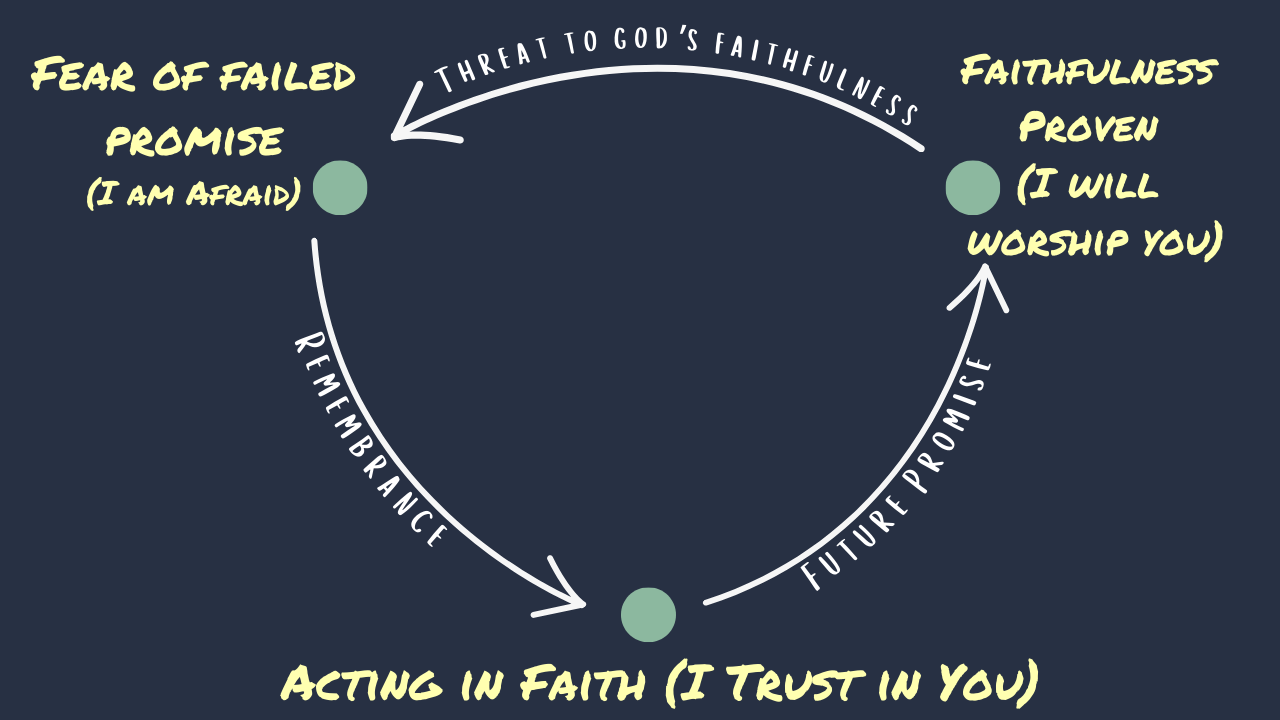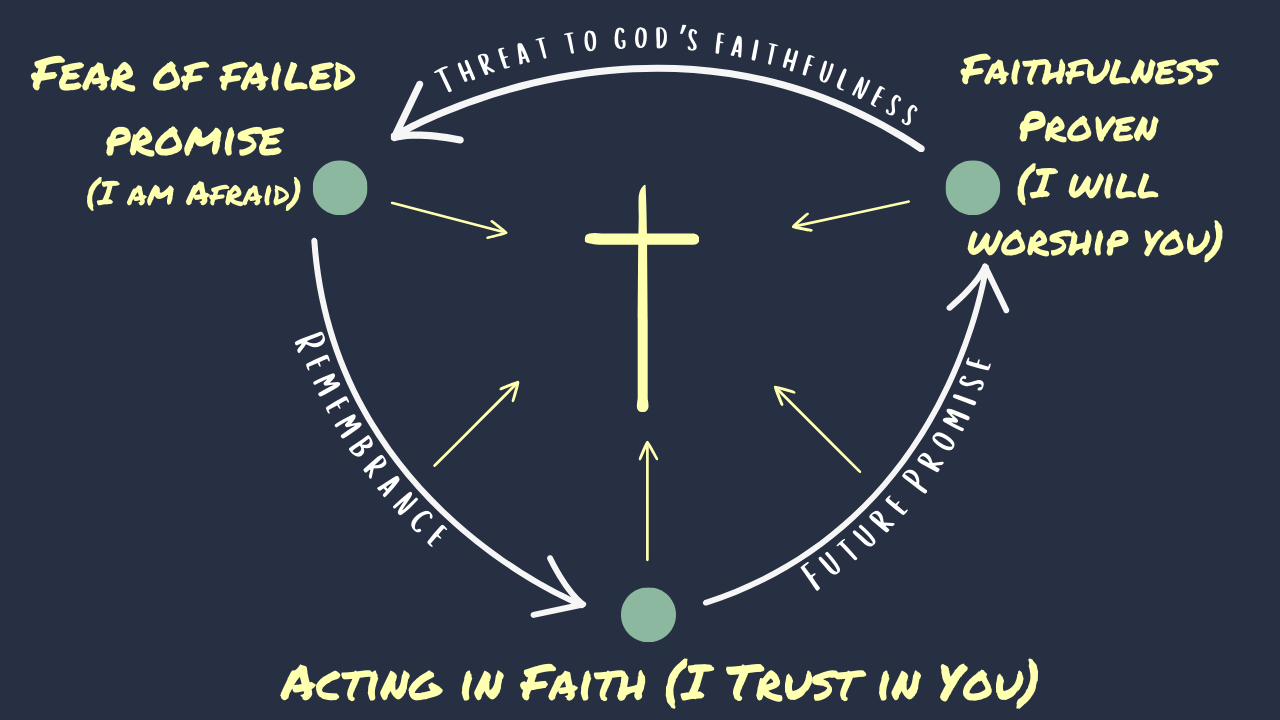
During our study of Genesis and particularly as we've looked closer at the tumultuous life of Jacob, I've noticed something being developed in the lives of the patriarchs that takes full form in the Psalms and other places in Scripture. It's a pattern of what the people of God do in the face of incredible difficulty which bends them towards greater trust in him rather than causing them to spiral further into doubt. This pattern seems incredibly important for us to follow when questions arise such as: "What should I do when God seems like a liar?" "What's my next step when it seems that his word has failed?" "What do I do when his faithfulness is coming under threat based on what I see happening in my life?"
Scripture gives many examples of godly, humble men and women bringing gut-wrenching questions to God in hopes that he will answer them. Questions much like ours mentioned above, "Has his steadfast love forever ceased? Are his promises at an end for all time?" (Psalm 77:8 ESV) or "How long shall I cry for help, and you will not hear?" (Hab. 1:2 ESV). What I find remarkable is that God has graciously embedded these into his own Word as he shepherds us through situations that would cause us to cry out in much the same way. What we can gain from these Spirit-inspired questions is not only the freedom to ask them ourselves but also an aid to renew our trust in our faithful God in the face of deep uncertainty.
The following example is based specifically on Jacob's experience in Genesis 32-33 when he is crippled beneath a fear of his brother Esau's potential revenge. It seems that God will not fulfill his word to bring Jacob back to the land of Cannan as he promised (Gen. 28:15; 31:13 ESV). To put it lightly— Jacob is afraid. In the midst of his terror though, Jacob remembers and repeats God's stated promise along with God's proven faithfulness to him in the past (Gen. 32:9-12 ESV). He is then reassured by God's faithfulness but is still forced to move ahead with some level of uncertainty. This is where Jacob encounters God in a mysterious wrestling match and his name is changed to Israel (Gen. 32:22-32 ESV). With Jacob's name change comes the assurance that God is not done with him just yet and that more lies ahead for him beyond the threat of his brother. So, he acts in faith based upon that future promise and goes to meet Esau. Surprisingly, Esau does not kill him. Instead, by God's powerful mercy on Jacob, Esau hugs him, kisses him, and weeps over him. Jacob is stunned by God's ability to prove himself even in the face of such danger. Jacob's fitting response is to erect an altar (Gen. 33:20 ESV) in worship to God, memorializing these great moments of deliverance.
Through this story we see Jacob move from great distress and fear to acting in faith and then finally responding to God in worship. Such is the pattern that takes shape multiple times over throughout the pages of Scripture:

As Christians, we can follow this pattern with a few key adjustments to aid us in remembering God's promises, acting in faith, and seeing God prove his faithfulness over time. For Jacob, he relied upon God's word of promise to Abraham and Isaac and himself as reference points. For Christians, our reference point for God cementing his promises and proving his future faithfulness all at once is none other than the cross of Jesus Christ.
When it seems as if God's not going to work things for our good (Rom. 8:28 ESV) or that he may not be able to present us blameless on that final day (1 Cor. 1:4-9 ESV) or that he certainly won't raise us up from the dead (1 Thess. 4:16-17) or that he can't do away with our tears and pain (Rev. 21:4 ESV), we often are left confused and fearful of what's next. We wonder if the longstanding trial will be there to meet us again tomorrow or whether our hope for relief is just a religious pain-killer. While we are not guaranteed a specific answer to the "why's" and "when's" of our suffering, we are given a path to follow— one of consciously bringing to mind the faithfulness of our great God, proven at the cross, in order to press on in faith.
Our anxiety over a particular situation or our fear of what's to come are ultimately rooted in unbelief. We are not so sure that God will come through for us as his children and wonder if he will suddenly abandon us or slowly turn on us. Just as the problem lies in our hearts, so does the solution. The turning point of many lament psalms comes when a psalmist chooses to hyper-focus on the concrete moments of God's proven faithfulness in Israel's history (See Psalm 73:16-17; Psalm 77:10 ESV). In a similar way, we can recall not only God's proven faithfulness in our own lives but specifically in something grander than our own lives, the story of God's redemption which hinges upon the life, death, and resurrection of Jesus. We can look back through the pages of Scripture and see so many promises fulfilled in Christ:
- The seed of the woman will crush the head of the serpent (Gen. 3:15; Col. 1:15-20)
- The offspring of Abraham will bless the nations (Gen. 12:7; Gal 3:15-18)
- The Anointed Servant of God will suffer and be pierced for the sins of his people (Isaiah 52:13-53:6; Col. 2:14)
- The descendent of David, the root of Jesse, will be established on his throne forever. (2 Sam. 7:12-17; Acts 2:33)
Built into our Bibles is page after page of promise after promise and prediction after prediction that all center upon Jesus Christ. He is the one to whom we look for certainty as to whether God is going to continue to be true to the promises he has yet to fulfill. Was he true to his promise to bless the nations, pay for our sins, crush the head of the serpent, and sit on the throne of David? Yes. He was!
This "remembering" process is like a basic science experiment. We start with a question: which paper airplane will fly further? (or is God going to be faithful or not?). We come up with our hypothesis: This particular plane will fly further (or God will not be faithful). Then we check ourselves with the facts of our findings: the hypothesis was incorrect (or contrary to my own thoughts, God has proven himself faithful to his promises time and time again in the past). Our relationship with God is not mechanical like a science experiment, but the point is that putting ourselves through these intentional paces with Scripture as our guide and the Holy Spirit as our helper can prove to be vital when we are lost in the fog of suffering and fear.
It's only after being assured of God's past faithfulness that we can find fresh resolve to act in faith for whatever's next. Sometimes acting in faith means waiting patiently for an answer to our prayers. Sometimes it means doing what God seems to be prompting us to do. Other times it means continuing on and persevering in what we're already doing. Regardless, we move ahead, intentionally placing our trust in our faithful God and not in what we see.
No matter the person or the circumstance, God has made promises to us that have yet to be fulfilled in Christ. These are the things that we long to take place and yet may not happen until God restores all things through his Son and by the power of his Spirit. We long for an end to our suffering and we long for seeing God face to face, but the only way that those future promises hold any weight in our hearts is because we have witnessed God's faithfulness in the past! I think many of us can attest to the fact that repeating future promises means little if not backed by the gold standard of God's consistent, unchanging, committed love for us as his people since the beginning.
Many of God's promises to Christians will only come to fruition on the last day, however, as you experience his protective keeping (Psalm 121) or his turning a horrible situation to your good (Rom. 8:28; Gen. 50:20), you are exposed to opportunities to worship God and give thanks to him for proving his faithfulness. Even if we don't experience those moments often, we can always return to the cross to "see his love forever proved" as one song says. We will forever worship him for his trustworthiness proven at the cross and we can do so even while our questions linger.
This pattern is not one that we engage in without the help of the Holy Spirit. We are unable to see the value of God's promises or trust his faithfulness without his help. Nonetheless, I pray that this path becomes a well-worn one for all of us as we continue to "Fight the good fight of the faith. (and) Take hold of the eternal life to which [we] were called..." (1 Timothy 6:12 ESV).